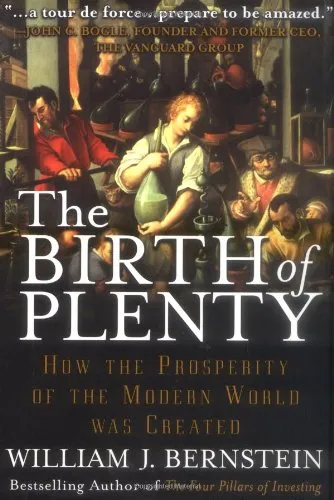The Birth of Plenty : How the Prosperity of the Modern World was Created
4.9
Reviews from our users

You Can Ask your questions from this book's AI after Login
Each download or ask from book AI costs 2 points. To earn more free points, please visit the Points Guide Page and complete some valuable actions.Introduction
Welcome to an exploration of the forces that have shaped the wealth and prosperity of the modern world. "The Birth of Plenty: How the Prosperity of the Modern World was Created" by William J. Bernstein is a groundbreaking work that delves into the mechanisms and prerequisites responsible for the rapid economic growth and unprecedented standards of living that humanity has achieved since the early 19th century. This book provides a comprehensive analysis of history, economics, and the critical societal elements that have driven the dynamics of wealth creation. It tells the story of how innovation, governance, financial systems, and intellectual progress came together to create an era of prosperity.
Bernstein argues that prosperity is not an accident or the result of geographic luck but a deliberate outcome of certain essential conditions coming into alignment. By examining the great turning points in history as well as why some nations progressed while others faltered, the book paints a clear picture of how modern affluence emerged and why understanding its foundations is crucial for sustaining it in future generations.
Detailed Summary of the Book
The core thesis of "The Birth of Plenty" revolves around four essential conditions that sparked the rapid economic and social progress seen since the early 19th century. These "pillars of prosperity" are:
- Property Rights: Stable and enforceable property rights are critical for fostering innovation and protecting individual and corporate investments.
- Scientific Rationalism: Scientific inquiry and the pursuit of knowledge allowed humanity to transcend superstition and systematically harness nature's forces.
- Capital Markets: The ability to pool and allocate resources effectively through well-functioning financial systems unlocked massive long-term investments in infrastructure, business, and technology.
- Efficient Transportation and Communication: The development of infrastructure helped connect markets, people, and ideas, accelerating the exchange of goods and innovation.
Through these pillars, Bernstein examines how the Industrial Revolution marked an inflection point in global development. He contrasts this period with earlier eras when similar conditions were absent, explaining why the Middle Ages or Ancient Rome failed to generate sustained prosperity on a comparable scale. Furthermore, the book explores the uneven distribution of these forces, analyzing why some nations advanced rapidly while others stagnated or fell behind.
In addition to looking backward, Bernstein extends his analysis into the future, posing critical questions about the sustainability of prosperity in the modern age and the threats, such as mismanagement of resources, political instability, or neglect of the essential pillars, that could derail continued progress.
Key Takeaways
- Economic growth and societal innovation do not happen by chance—they require specific enabling factors.
- The alignment of property rights, financial systems, scientific progress, and shared knowledge creates a fertile ground for prosperity.
- Historically, nations that failed to establish these conditions have seen stagnation or decline in growth.
- Understanding the foundations of prosperity is vital for sustaining it in the long term and addressing global disparities.
- While technological advancements continue to accelerate progress, they are not a substitute for stable governance and equitable institutions.
Famous Quotes from the Book
"History teaches us that without property rights, no society can prosper."
"Scientific rationalism is not just the basis of technological progress; it also represents a worldview that promotes curiosity and objective thinking."
"Capital markets do not merely provide wealth; they serve as the engine of progress by channeling resources to their highest uses."
"The infrastructure of communication and transportation is the backbone upon which commerce and cultural progress rely."
Why This Book Matters
"The Birth of Plenty" is not just a history book; it is a roadmap for understanding the economic and social progress that underpins much of the modern world. In a time when globalization, technology, and political disruption are shaping societies at an unprecedented pace, this book provides essential insights into what fosters lasting prosperity and what risks undermining it.
Bernstein’s focus on the interplay of governance, innovation, and economic systems makes this book an invaluable resource for policymakers, business leaders, academics, and anyone interested in the forces driving the modern world. Its lessons are timeless, offering both an explanation of the past and a guide to ensuring a prosperous future. The book matters because it highlights that progress is not inevitable—it depends on deliberate choices about enabling the right institutions and nurturing the critical pillars of growth.
Free Direct Download
You Can Download this book after Login
Accessing books through legal platforms and public libraries not only supports the rights of authors and publishers but also contributes to the sustainability of reading culture. Before downloading, please take a moment to consider these options.
Find this book on other platforms:
WorldCat helps you find books in libraries worldwide.
See ratings, reviews, and discussions on Goodreads.
Find and buy rare or used books on AbeBooks.
1189
بازدید4.9
امتیاز50
نظر98%
رضایتReviews:
4.9
Based on 0 users review
"کیفیت چاپ عالی بود، خیلی راضیام"


